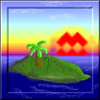 Nations: Mania: Territory
Nations: Mania: Territory Nations: Mania: Territory
Nations: Mania: Territory Article 5 of the constitution defines Mania's territory as that part of the world closer to its person than to anyone else at any given time.
Article 5 of the constitution defines Mania's territory as that part of the world closer to its person than to anyone else at any given time.
Though this unique and dynamic definition inspires many interesting reactions, by far the most common is:
"Eh?"
The answer to this challenging enquiry will bring together issues of politics, geometry, and bits of brightly coloured self-adhesive plastic, in a way not attempted since V. I. Lenin's What Is To Be Done About Sticky Green Triangles?, a titled shortened by his publishers to What Is To Be Done? on the grounds that they'd just cut all the bits about sticky green triangles, and though they were very funny, would he please stop pissing about and concentrate on finishing his Collected Works in time for the Christmas market, or at least before he died.
OK, here is where we break out the sticky-back plastic to create a dazzling series of brightly coloured schematic diagrams which, if they don't explain anything, will at least break up the text and add a bit of colour.
 World population: 2Here, the blue circle represents Mrs Peacock, and the red circle me. We will imagine, for the moment, that we are the only two people on earth, and that the earth is not in fact spherical, but flat and infinite: like Slough.
World population: 2Here, the blue circle represents Mrs Peacock, and the red circle me. We will imagine, for the moment, that we are the only two people on earth, and that the earth is not in fact spherical, but flat and infinite: like Slough.
Given that Mania covers everywhere closer to me than to Mrs Peacock, what does the border between us look like?
In fact, it is simpler than you may imagine. Draw a straight line between us, and the border will naturally cut this line in half: half the line being closer to her, and half closer to me. The centre of the line gives us a point on the border.
The rest of the border is simply a straight line drawn through this point, perpendicular to the line between us. In the diagram, the border is shown in blue. Mania, on my side, is white, and everywhere else is black. Effectively, the infinite plane has been divided in two by this line, and the half I stand in is Mania.
 World population: 3Here, the world population has been increased to three, somewhat mysteriously as I haven't laid a finger on Mrs Peacock. The third person is Reverend Green, standing to my east.
World population: 3Here, the world population has been increased to three, somewhat mysteriously as I haven't laid a finger on Mrs Peacock. The third person is Reverend Green, standing to my east.
Now, a new Manic border has sprung up between myself and him. Once again, it is a straight line, cutting the line between us half way along, and at right angles. Removing the land now closer to Reverend Green reduces Mania to an infinitely long, north-south corridor.
 World population: 4Colonel Mustard's arrival to my north creates a third border. As with all borders between myself and another individual, it is a straight line: but this time it is not infinitely long. It is shown in yellow on the diagram, and extends from my border with Mrs Peacock (in blue) to my border with Reverend Green (in green). Mania is now bounded on three sides, thought it still extends infinitely to the south.
World population: 4Colonel Mustard's arrival to my north creates a third border. As with all borders between myself and another individual, it is a straight line: but this time it is not infinitely long. It is shown in yellow on the diagram, and extends from my border with Mrs Peacock (in blue) to my border with Reverend Green (in green). Mania is now bounded on three sides, thought it still extends infinitely to the south.
 World population: 5And so the process continues. Professor Plum turns up to my north west, and another lump is taken out of the corner of Mania.
World population: 5And so the process continues. Professor Plum turns up to my north west, and another lump is taken out of the corner of Mania.
 World population: manyAs more people are added in a circle around me, Mania's border consists of ever shorter straight lines, and begins to look like a circle too.
World population: manyAs more people are added in a circle around me, Mania's border consists of ever shorter straight lines, and begins to look like a circle too.
 The territory and the flagIf the diagram above looked familiar, it is because it was the conceptual model for the Manic flag, as you can see more clearly here.
The territory and the flagIf the diagram above looked familiar, it is because it was the conceptual model for the Manic flag, as you can see more clearly here.
Below, the territorial symbolism of the flag is demonstrated in a television news style graphic featuring by a highly skilled team of radio-active jelly babies.
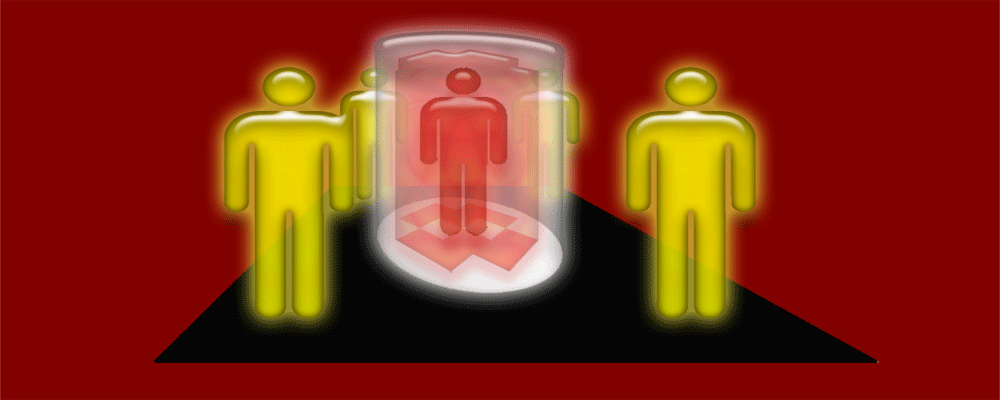
 Some remain skepticalPiercingly brilliant though this analysis has been, some commentators remain skeptical about Mania's claim to its territory.
Some remain skepticalPiercingly brilliant though this analysis has been, some commentators remain skeptical about Mania's claim to its territory.
Mania wishes to thank those who have asked questions - even those who did so dressed, somewhat inexplicably, as lovable forest animals - and answers the most common ones below:
 Demands fixed bordersMania's borders move around. Shouldn't borders be fixed?
Demands fixed bordersMania's borders move around. Shouldn't borders be fixed?
No state in the world enjoys fixed borders! Indeed, history, as it is still sadly taught in many schools, is largely an account of the way in which borders have expanded and contracted with the fortunes of states in international games of empire, diplomacy and war.
 Another generation is introduced
Another generation is introduced
to the joys of nationalityNor is this ancient history: in the last fifteen years we have seen the break up of the USSR, Yugoslavia, and Czechoslovakia, into 22 states; the reunification of East and West Germany, and North and South Yemen; and independence for Namibia, the Marshall Islands, Micronesia, Eritrea, Palau, and East Timor. On average, a new state has been created every six months since 1990.
Worse, at this very moment, between 20 and 40 wars (depending on your definition) are still being fought for the creation of new states, the control of old ones, or the expansion of their territory. All in all, two things are clear: the borders of states are anything but permanent, and an awful lot of lives are being expended moving them about.
 Challenges mobile sovereigntyBut Mania seems to move around. Shouldn't countries stay in one place?
Challenges mobile sovereigntyBut Mania seems to move around. Shouldn't countries stay in one place?
This is essentially another form of the previous question, to which the previous answer still applies: after all, a state's territory moves whenever its borders move. However, if this really confuses you, perhaps you'd be happier comparing Mania to a ship. Ships are a little floating lumps of their country of registration, carrying their sovereignty with them.
Strangely, a lot of them are Liberian. In fact, on paper, this poor, war-torn African country has a shipping fleet three times the size of that of the United States. This strange outbreak of Liberian patriotism amongst American and European shipping companies is rewarded by the Liberian government exempting them from paying taxes on their profits.
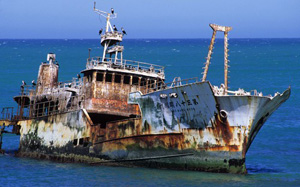 The Liberian ship SS "Floating Death", crewed by seagulls
The Liberian ship SS "Floating Death", crewed by seagulls
Carrying crude oil, nuclear waste, and Sunny DelightIn fact, the Liberians are so pleased with their new floating territories, and the registration fees which accompany them, that they remain extremely relaxed about checking the ships for luxuries such guidance systems, trained crews, and wall-to-wall floors. A Liberian government engineer will carry out a brief inspection, and once he has confirmed that your cheque has been signed and dated, you can float off in your little corner of Africa.
If these vessels can be recognised as somehow Liberian, then Mania's claim to its territory seems, by comparison, water-tight: which is more than you can say for many of the ships.
 Values territorial expanseSurely Mania is too small to have sovereignty?
Values territorial expanseSurely Mania is too small to have sovereignty?
Hasn't anyone ever told you that size isn't important? Perhaps, like me, you felt the assertion was somewhat undermined by the laughter and pointing.
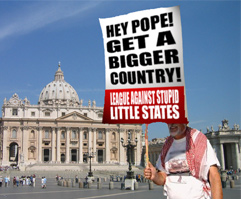 Hey pope!In any event, Mania has no fixed size, and (for instance) by the simple expedient of walking along a deserted beach I can become President of a state hundreds of square kilometres in size, its extent limited only by the position of the nearest ships. It is certainly not difficult to exceed the Vatican City State's 0.4 square kilometres, and I'd be interested to know if you plan to stand outside the Vatican with a placard reading 'Why's your country so small then, "Pope Boy"?'. (Actually, I'd pay to see that.)
Hey pope!In any event, Mania has no fixed size, and (for instance) by the simple expedient of walking along a deserted beach I can become President of a state hundreds of square kilometres in size, its extent limited only by the position of the nearest ships. It is certainly not difficult to exceed the Vatican City State's 0.4 square kilometres, and I'd be interested to know if you plan to stand outside the Vatican with a placard reading 'Why's your country so small then, "Pope Boy"?'. (Actually, I'd pay to see that.)
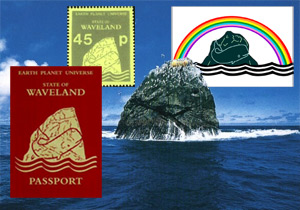 Rockall: a large rock
Rockall: a large rock
Waveland: Greenpeace's mocking state,
complete with passports, stamps, and flagWhen it comes to sovereignty, though, size really isn't everything. Rockall is a precarious, pointy rock sticking out of the north Atlantic about 350 kilometres from the nearest inhabited land. It is safely above laughing and pointing size, at about 30 metres in diameter, but still on the small side for human settlement. However, this uninhabitable, guano-covered, monstrously overgrown paperweight is simultaneously claimed by the United Kingdom, Ireland, Iceland, and Denmark. In 1985, in an gesture which makes the secession of Mania seem positively mundane, ex-SAS soldier Tom McLean lived on it from 26 May to 4 July, housed in a limpet-like small plastic capsule, to strengthen Britain's claim.
Since then, though, it has been 'invaded' a number of times: perhaps most famously by Greenpeace who declared it to be the independent state of Waveland, and passed a law banning all future drilling for oil in its waters. To listen to them, you'd think that was all the competing claims to sovereignty were really about.
 Wants international acceptanceHow can Mania be independent when it isn't recognised by any other states?
Wants international acceptanceHow can Mania be independent when it isn't recognised by any other states?
While there is no internationally agreed definition of what constitutes a state, the most famous legal precedent is the Montevideo Convention, signed in 1993 at the Seventh International Conference of American States. Amongst the signatories was US President Franklin D Roosevelt.
Perhaps its most famous provisions is that "The political existence of the state is independent of recognition by the other states." In place of recognition, the convention lays out four criteria for statehood:
(a) a permanent population: I am the permanent population of Mania. Indeed, I am so permanent, that unlike most populations, I take my country overseas with me on holiday.
 Franklin D Roosevelt
Franklin D Roosevelt
Recognised Mania's independence(b) a defined territory: The territory of Mania is clearly defined as that part of the world closer to its person than to anyone else at any given time in the constitution.
(c) government: I am the President of Mania, as explained in the constitution, and further described in this page on Manic government.
(d) capacity to enter into relations with the other states: Mania has demonstrated this ability through its exchange of ambassadors with the state of Ladonia, and is actively seeking to establish diplomatic relations with others.
So, the bourgeois president FDR, the revolutionary leader V I Lenin, and Article 1 of the UN Charter all recognised a people's right to national self-determination. None of them stipulated that this right was constrained by its recognition by other states.
 Seeks UN membershipWhy isn't Mania in the United nations?
Seeks UN membershipWhy isn't Mania in the United nations?
Because Mania's claim to independence is based on the wishes of the population, but it has no power to resist the rule of the British state: so, regardless of my wishes, it is the sovereignty of the British state that the UN will recognise. It is this key distinction which Mania was created to highlight and symbolise.
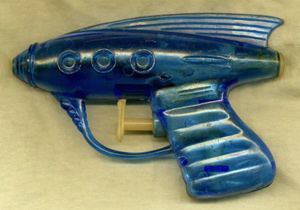 Mania's military arsenalThe UN is a club for those with power: for the world's ruling classes. The UN does not care if those being ruled consent to that rule: it welcomes dictators of every kind. If you are a minority with power over a majority, you are in, and how you hold that power is irrelevant. This is the true nature of the state, and it is implicitly and openly acknowledged in the structure of the United Nations. It is for this reason that I believe all such states to be prisons, and call for their destruction. This argument is developed more fully in my essay "imagine...".
Mania's military arsenalThe UN is a club for those with power: for the world's ruling classes. The UN does not care if those being ruled consent to that rule: it welcomes dictators of every kind. If you are a minority with power over a majority, you are in, and how you hold that power is irrelevant. This is the true nature of the state, and it is implicitly and openly acknowledged in the structure of the United Nations. It is for this reason that I believe all such states to be prisons, and call for their destruction. This argument is developed more fully in my essay "imagine...".